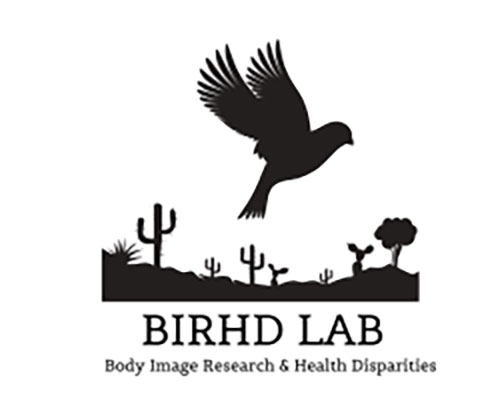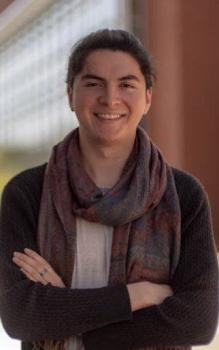
Body Image Research and Health Disparities (BIRHD) (Perez)

NOTE: Undergraduate research assistants are IN-PERSON within the Phoenix community.
Current Projects:
Under Dr. Perez’s guidance, undergraduate and doctoral students explore the genetic, biological, psychophysiological, cultural, and environmental underpinnings of body image and eating behavior in its development towards unhealthy lifestyles. We continuously translate our basic science research into clinical applications that can improve the health and quality of life of people across the life span.
Trajectories of Health among Low-Income Mexican American Families.
We capitalize on longitudinal data collected by an NIMH and NICHD-funded study of very low income Mexican American mothers and infants (Las Madres Nuevas) that assesses a multitude of cultural and environmental risk and protective factors from the prenatal period through nine years of age. This study, with data drawn from biological measures, anthropometric measures, parent report, medical records, and observational sessions, is ideally situated to answer key questions related to health disparities. It aims to evaluate the consequences of cultural, economic, maternal and child trajectories for emerging physical health and cardiometabolic risk in a sample of over 300 children.
The Prevention of Body Dissatisfaction and Correlates
Childhood
Our past research in children demonstrates that thin-ideal internalization emerges before body dissatisfaction. Further, girls between the ages of 5 to 7 years old role model their mother’s body satisfaction and dissatisfaction. We are collaborating with Dove Self Esteem Project to create a curriculum for teachers that builds body confidence in youth ages 9 to 11 years. The Dove Self-Esteem Project aims to build self-esteem and body confidence in youth so that they may reach their full potential. For over a decade, Dove Self Esteem Project has developed and disseminated interventions for girl scouts, middle school, and high school youth. Continuing their line of products and materials, we are working together in developing evidence-based materials for elementary school children that builds self-esteem and body confidence, while reducing weight-based bullying and teasing that reflects the most current knowledge of the science in child development, learning, and mental health prevention.
We have assisted in the design, development, and testing of:
- Amazing Me program, an evidence-based program designed to help children ages 9 to 11 build self-esteem, body confidence, and eliminate weight-based bullying and teasing. This school-based curriculum satisfies national educational health requirements and provides tools for teachers to implement in 4th and 5th grade classrooms.
- My Hair My Crown program is designed to help girls between the ages of 11 and 14 years boost self-esteem, hair satisfaction, and acceptance. This workshop is inspired by The CROWN Act, which was co-created by the CROWN Coalition and Dove, in collaboration with other partners. The CROWN Act aims to ensure protection against discrimination based on racialized hairstyles by extending statutory protection to hair texture and protective styles in the workplace and public schools.
- Celebrándome is designed to help adolescents ages 11 to 14 years who identify has Hispanic or Latine build self-esteem, and body confidence.
Adolescence and Adulthood
The Body Project is a cognitive-dissonance based body acceptance program that is designed to help adolescents and young adults resist societal pressures that promote unrealistic body ideals. This program has been heavily tested for over two decades and has been found to reduce appearance-ideal internalization, body dissatisfaction, and unhealthy behaviors related to eating disorders and obesity. Peer Leaders who run the program undergo extensive training in the program while building essential community leadership skills that are applicable across any life stage. ASU has successfully implemented this program since 2013. Between the years 2013 – 2018, over 5000 undergraduate women have participated in the program at ASU. Currently, Dr. Perez is a Master Trainer for the Body Project in conjunction with the Body Project Collaborative and National Eating Disorders Association, to train other mental health professionals and universities in implementing the program.
Lab Director & Principal Investigator: Dr. Marisol Perez, Associate Professor
Dr. Perez received her undergraduate degree in Psychology from University of Miami and her doctoral degree in Psychology from Florida State University. Curriculum Vitae.
Doctoral Students:
Juan Carlos Hernandez, M. A.
Doctoral Graduate Student in Clinical Psychology
Juan’s research aims to explore relations between eating, culture, and mental health across ethnic minority child development. Juan uses an ecological systems perspective to study longitudinal nested sources of influence including sociocultural stressors, food environments, family dynamics, and intra-child symptom networks. Clinically, Juan is interested in working with minority children experiencing body image and eating concerns using family-based cognitive behavioral approaches. Juan’s personal interests include desert field recording and Topo Chico.
Kimberly Yu, M.A.
Doctoral Graduate Student in Clinical Psychology
Kim’s research interests address the etiology, prevention, and treatment of disordered eating pathology and body dissatisfaction. Specifically, she is interested in examining the longitudinal effects of psychosocial stress, stigma, and intersectionality on disordered weight control behaviors among diverse populations. She is also interested in the association between intersectional identity and disparities in physical and mental health outcomes. Clinically, Kim uses cognitive-behavioral and dialectical-behavioral modalities in her work with children, adolescents, and young adults and is interested in treating disordered eating and body image concerns. Kim also enjoys hiking, baking, and eating different types of noodles.
Francesca Gomez, B.A.,
Doctoral Graduate Student in Clinical Psychology
Francesca’s research interests aim to understand the aggregate risk for eating disorders among individuals in minority populations and identify points of intervention to address healthcare disparities. In particular, she is interested in understanding the role and experience of eating disorders within diverse populations experiencing multiple minority stressors. If she is not in the BIRHD lab, you will probably find her in a local dance studio.
Undergraduate Students
Jenna Stadheim (she/her)
Jenna received her Bachelor of Arts in Psychology and a Bachelor of Science in Family and Human Development from Arizona State University in May 2019. Following graduation, she worked as a Behavior Therapist at the Southwest Autism Research and Resource Center in the Teen and Adult Services, where she provided in-home treatment to adolescents and adults with autism spectrum disorder. She previously worked as an Assistant Project Coordinator for the Amazing Me Study and now works as a Project Coordinator in the Social Competence and Treatment Lab at Stony Brook University. Jenna intends to pursue a Ph.D. in Clinical or School Psychology to investigate the role of service initiation and continuation within school systems among youth with developmental disabilities on broader developmental and educational outcomes.
Taryn Henning (she/her)
Taryn Henning received her B.S. in Psychology and Family and Human Development from Arizona State University in 2020. She previously worked as a research assistant in the Las Madres Nuevas lab as a Child Interviewer and is now the project coordinator for the Amazing Me Study and other projects in the BIRHD Lab. Taryn intends to pursue a Ph.D. in Clinical Psychology to investigate disordered eating pathology in sexual and gender minority populations. When she is not working, she enjoys hiking, reading, and traveling to see her family.
Jennifer DeJesus (she/her)
Jennifer is a junior and currently working toward a Bachelor of Science in Psychology at Arizona State University. She works as a Store Manager Trainer at Starbucks and aspires to pursue a doctoral degree in Psychology. Jennifer spends most of her free time exploring the city and nature with her fiancé and their two pugs. She also enjoys reading, painting, baking, hiking, and hosting game nights.
Anna Von Schell (she/her)
Scale up of non-specialty mental health settings (e.g., social or support groups, employee assistance programs, educational settings) significantly accounts for disparities in mental health and academic achievement across life course. Anna’s research aims to identify novel intervention strategies that improve access, engagement, retention, treatment adherence, quality of care, and mental health outcomes among sexual and gender minority (SGM) students. Specifically, her research will examine the adaptations that address social cultural barriers which aim to change cognitions (e.g., knowledge, attitudes, beliefs), behaviors (e.g., clients, providers), and structures (e.g., clinics, systems) to improve the quality of mental health care for all. Anna’s additional research interests include mutable and mechanistic causes of disparities in mental health clinical and functional outcomes from which interventions targeting health equity can be developed and tested. Leisurely, she teaches yoga, drinks tea, and has existential conversations with her dogs while fishing.
Alumni
Tara K. Ohrt, Ph.D.
Tara’s research interests aim to address the influence of biological, physiological, psychological, and/or sociological variables on the development, presentation, prevention, and treatment of disordered eating and obesity. Currently, I am focusing on the mother-child dyad and how children impact the weight status of their parents, a previously unexplored question. This line of research has significant clinical implications since current childhood obesity interventions that take a family system approach fail to consider how the match or mismatch between parent and child temperament impacts food choice, healthy eating practices, and influences weight status for the family.
Select Publications (†† indicates undergraduate student coauthor; † indicates graduate student coauthor)
Henning, T., Holman, M., Ismael, L.,Yu, K., Williams L., June S., & Perez, M. (under review). Examination of Hair Experiences among Girls of Black/African American Identities. Body Image
Von Schell, A. ††, Perez, M., Ohrt, T. †, Bruening, A. †, & Stinson, E. †† (2018). An examination of prevalence rates of disordered eating symptoms among sexual minority undergraduate men and women. Psychology of Sexual Orientation and Gender Diversity, 5(3), 352-359.
Yu, K., Chan, S., & Perez, M. (2019). Guidelines for identification and treatment of eating disorders among Asian Americans. Professional Psychology: Research and Practice, 50, 279-287.
Hernández, J., Gomez, F., Stadheim, J., Perez, M., Bekele, B., Yu, K., Henning, T. (2021). Hourglass Body Shape Ideal Scale and Disordered Eating. Body Image. https://doi.org/10.1016/j.bodyim.2021.03.013
Yu, K. †, Chan, M. S., & Perez, M. (in press). Clinical treatment and practice recommendations for disordered eating in Asian Americans. Professional Psychology: Research and Practice.
Yu, K. † & Perez, M. (in press). The association between maternal criticism and body dissatisfaction on disordered eating pathology across racial and ethnic groups. Cultural Diversity and Ethnic Minority Psychology.
Zhou, Z. †, Liew, J., & Perez, M. (in press). Parent feeding as mediating mechanisms between child appetitive traits and body mass index. Journal of Applied Developmental Psychology.
Bruening, A. B. †, & Perez, M. (in press). Prevalence rates and norm data from the EDE-Q for ethnic minority college women. Eating Disorders: The Journal of Treatment and Prevention.
Josephs, J. ††, Perez, M., Trujillo, E., & Ramirez, A. L. (in press). Use of cognitive behavioral therapy with Spanish-speaking clients suffering from Eating Disorders. Eating Disorders: The Journal of Treatment and Prevention.
Lin, B. †, Liew, J. & Perez, M. (2019). Measurement of self-regulation in early childhood: Relations between laboratory and performance-based measures of effortful control and executive functioning. Early Childhood Research Quarterly, 47, 1-8.
Perez, M., Ohrt, T. K. †, Bruening, A. B. †, Taylor, A. B., Liew, J., Kroon Van Diest, A. M. W. †, Ungredda, T. † (2018). An evaluation of the reliability and construct validity of child feeding and eating measures across gender, ethnicity, and household food security. BMC Obesity, 5(17). Open access: https://bmcobes.biomedcentral.com/track/pdf/10.1186/s40608-018-0192-6.
bmcobes.biomedcentral.com RESEARCH ARTICLE Open Access Measurement equivalence of child feeding and eating measures across gender, ethnicity, and household food security Marisol Perez1*, Tara K. Ohrt1, Amanda B. Bruening1, Aaron B. Taylor4, Jeffrey Liew2, Ashley M. W. Kroon Van Diest3 and Tatianna Ungredda4 Abstract |
Stinson, E. J. ††, Perez, M., Ohrt, T. †, Von Schell, A. †, Bruening, A. † (2018). The association between program credibility, expectancy, and acceptability with baseline pathology and outcome for a body acceptance prevention program. Journal of Clinical Psychology, 74, 2161-2172.
Von Schell, A. ††, Perez, M., Ohrt, T. †, Bruening, A. †, & Stinson, E. †† (2018). An examination of prevalence rates of disordered eating symptoms among sexual minority undergraduate men and women. Psychology of Sexual Orientation and Gender Diversity, 5(3), 352-359.
Bruening, A.B. . †,, Perez, M., & Ohrt, T.K. . †, (2018). Exploring weight control as motivation for illicit stimulant use. Eating Behaviors, 30, 72-75.
Smith, H. ††, Perez, M., Sladek, M. R. †, Becker, C. B., Ohrt, T. K. †, & Bruening, A. B. † (2017). Development and validation of makeup and sexualized clothing questionnaires. Journal of Eating Disorders, 5, 39 . https://doi.org/10.1186/s40337-017-0171-1.
Becker, C.B., Perez, M., Kippela, L.S., Deidrichs, P., Trujillo, E., & Stice. E. (2017). Engaging stakeholder communities as body image prevention partners: The Body Project as a case example. Eating Behaviors, 25, 62-67
We have had a productive and accomplished year!
- Tara Ohrt completed her PhD! Congrats, Dr. Ohrt!
- Francesca Gomez was awarded the Interdisciplinary Fellowship and the Dr. Elizabeth Capaldi Phillips Memorial Award for Graduate Research in the Psychology of Eating.
- Juan Hernandez and Kimberly Yu won the Sharon Manne Graduate Student Research Award.
- Juan Hernandez won the Harry Lowell Swift Advancing Health Scholarship.
- Kimberly Yu was awarded a Graduate College Completion Fellowship.
- Our team published a paper in the Journal of Abnormal Psychology.
- Taryn Henning and Jenna Stadheim presented posters at ABCT and SRCD.



